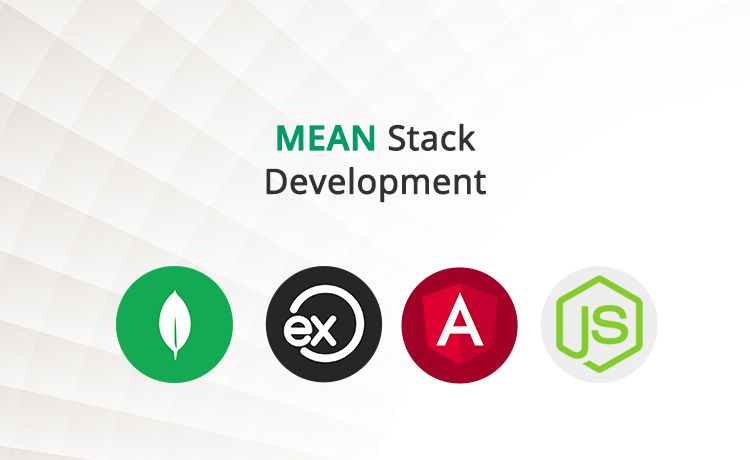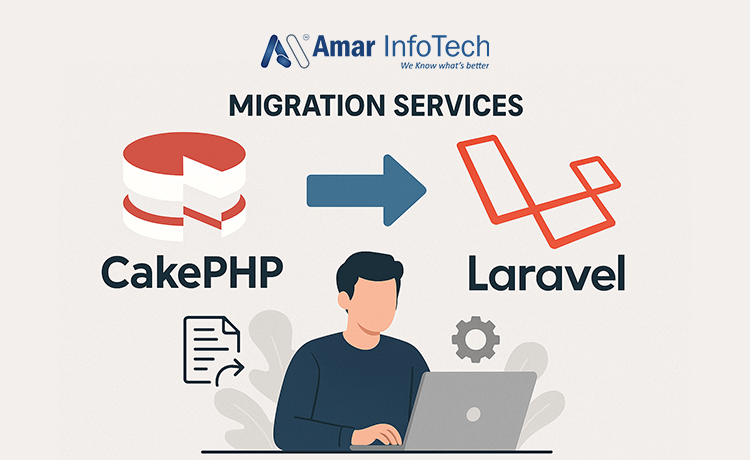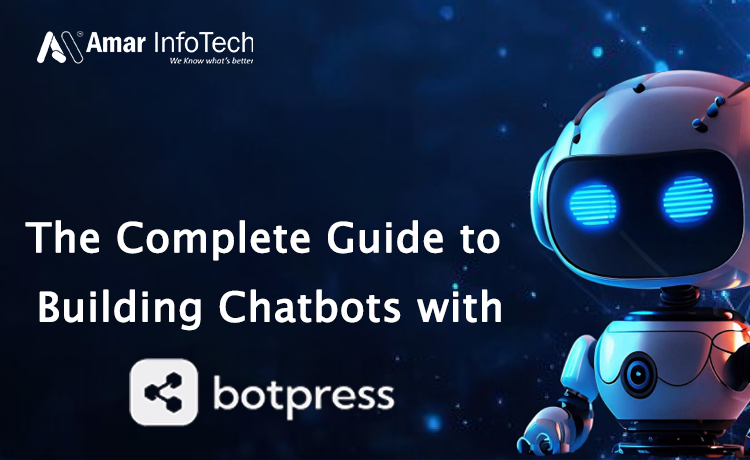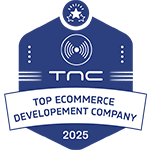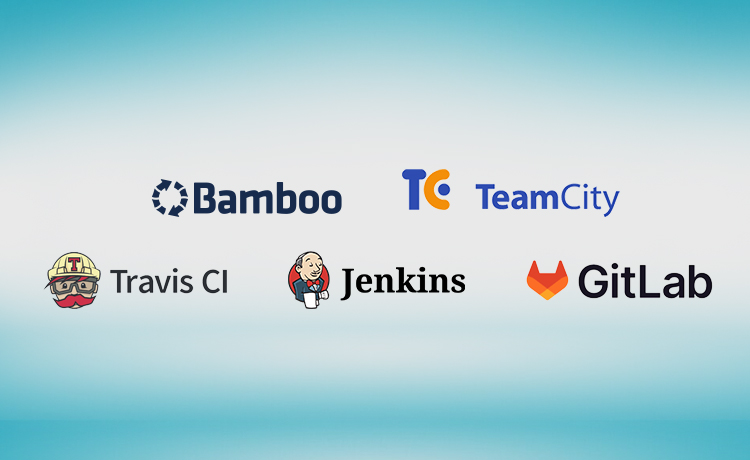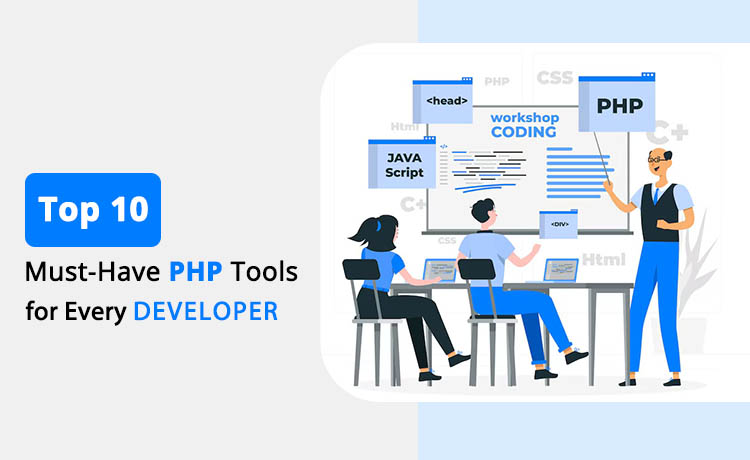With the current technological innovations in web development, many development technologies have come up to satisfy the insatiable need for digital transformation, MEAN stack is one such technology which provides full-stack Javascript solution that helps you build fast, robust and maintainable production web applications using MongoDB, Express, AngularJS, and Node.JS.
What does it mean to be a mean stack developer? A MEAN stack developer uses the MEAN stack (duh) which is:
MEAN STACK:
MEAN is a more modern stack challenging the LAMP stack. It’s entirely JavaScript-powered, too, so that makes it a time and money-saver for companies that already have JavaScript pros writing client-side code. It includes the MongoDB (database system), Express.js(back-end web framework) the AngularJS (front-end framework), Node.js (back-end runtime environment). It offers flexibility and lots of features for building single- and multi-page web applications.
M: MongoDB:
MongoDB is a cross-platform document-oriented database-classified as a NoSQL database which eschews the traditional table-based relational database structure in favor of JSON-like documents with dynamic schemes.
Fast NoSQL schema-less database written in C++.
Document-Oriented Storage.
JSON Style documents with dynamic schemas.
Full Index support available.
MongoDB is Lightning fast and Auto-sharding.
You can perform rich queries, can create on the fly indexes with a single command.
Advantages:
E: ExpressJS:
Express is a minimal and flexible node.js web application framework, providing a robust set of features for building single and multi-page, and hybrid web applications.
Node JS based web framework.
Based on connecting middleware.
Easy to implement REST API.
Easy to implement session management.
Support several template rendering engines.
Implements MVC Pattern.
Express allows to set up middlewares to respond to HTTP Requests.
Defines routine table which is used to perform the different action based on HTTP method and URL.
Allows to dynamically render HTML pages based on Passing arguments to templates.
Regardless of complexity, there should be very few roadblocks if you know javascript well.
Supports concurrency well.
Fast and performance are comparable with Golang micro frameworks and Elixir Phoenix.
Advantages:
A: AngularJS:
AngularJs is an Open-Source Javascript framework, maintained by Google, that assists with running single-page applications. Its goal is to augment browser-based applications with model-view-controller (MVC) capability, in an effort to make both development and testing easier.
A Javascript framework developed by Google.
Based on Model-View Pattern(client-side).
Declarative Programming and directives are integrated with HTML directly.
Great for Front-end development especially for SPA(Single Page Applications) and mobile applications.
Very modular and extensible makes testing an ease.
Fast development process.
Makes Apps Scalable.
Awesome Performance.
Advantages:
N: Node JS:
Node.js is a platform built on Chrome’s JavaScript runtime for easily building fast, scalable network applications. Node.js uses an event-driven, non-blocking I/O model that makes it lightweight and efficient, perfect for data-intensive real-time applications that run across distributed devices.
Can easily handle 10k concurrent connections and doesn’t have any problems with concurrency.
Easily Scalable which just create the cluster.
The Very Fast development process.
Node Js have ever-growing NPM.
Real-time web apps.
Advantages:
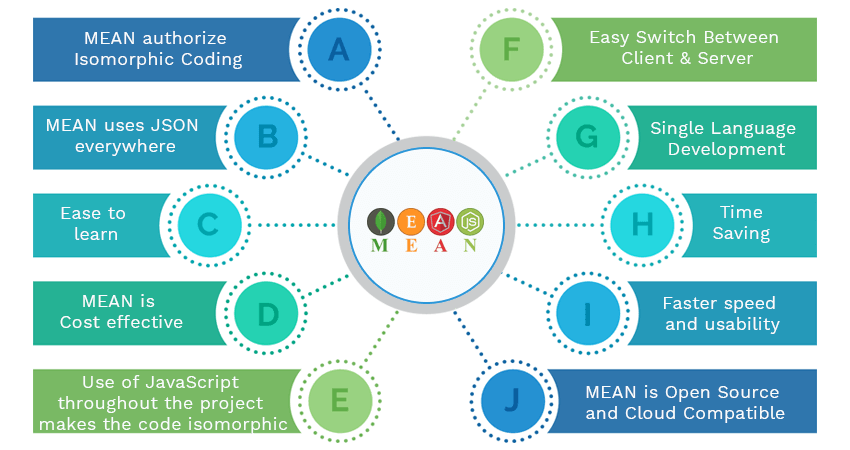
Here, I am going to discuss some of the advantages of MEAN stack that will summarize its potential and help developers to know as to why they should be using it on their mobile apps and websites.
1) MEAN authorize Isomorphic Coding:
Isomorphic coding authorizes running a code written within one framework on other frameworks without much alters to the original code. Moving the code to another framework that is written in one particular framework is made easier with the help of MEAN stack.MEAN allows transferring the code between frameworks. This is where MEAN stack development is ahead of the rest of the development pack.
2) MEAN uses JSON everywhere:
Both AngularJS and Node.js framework uses JSON(Javascript Object Notation). MEAN stack uses JSON as the format for data-interchange on all the layers. So, there is no need to use libraries for converting data during a client-side and server-side interaction. At Amar Infotech, we frequently render MEAN Stack development services across app and web development projects.
3) MEAN is Open Source and Cloud Compatible:
All the MEAN stack technologies are open source and available for free. It lowers development cost and helps the development procedures using useful libraries and public repositories available for free on the web. At Amar Infotech, we ask our repositories and libraries develop and maintained under the direction of competent workforce. Our experienced MEAN Stack developers greatly contribute to that knowledge resource
In case your project requires to implement cloud services within the mobile app, MongoDB is a great option to choose. MongoDB was built specifically to make it easy to host the web applications onto the cloud. It also brings in an ease in performing tasks like testing and maintaining.
4) MEAN is Cost effective:
Developing web apps with MEAN stack needs developers who are experts at JavaScript, whereas LAMP stack needs developers who are expert in MySQL, JavaScript, and PHP. It uses one language throughout, which means that a company does not have to hire different specialists.
5) Faster speed and usability
All the MEAN technologies have faster speed and usability. Node.js is quick and ascendable because of its non-blocking architecture. Angular.js is an open source JavaScript framework that provides maintenance, testability, and reusability.
6) Use of JavaScript throughout the project makes the code isomorphic
MEAN permits us to transfer between different frameworks. If we write the code in a specific framework and then decide to shift it to another, it can be done so effortlessly and will function in the exact same way. Javascript is one of the most popular languages in the world with numerous advantages. If you write a code for Node & decide it’s better placed in AngularJS, you can move it over with ease. This is the reason why MEAN based web apps are flexible to code.
7) Easy Switch Between Client & Server
MEAN is simple and fast because everything is written in one language. As a result, it is quite easy to switch between client and server.
8) Single Language Development
The most obvious benefit is that the complete code for the development will be written in JavaScript. This would be a blessing for developers who would have invested their time and money in learning the language from the scratch.
9) Time-Saving
When you need to develop an application within limited timelines, then MEAN is the way to go. It has an infinite set of module libraries for Node.js that are ready for use. It gives you more time to polish your project to perfection. Apart from this technology saving time, it results in the development of quality world-class applications.
10) Ease to learn
It is pretty easy to learn and flexible to grasp, understand and implement during development.
Conclusion:
In the end, Mean is a full stack, javascript, web application framework. If you require a fast, easy, simple way to create a modern, responsive, dynamic web site and app the MEAN would be a great solution.
